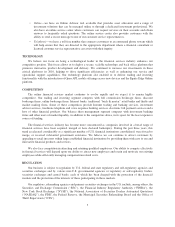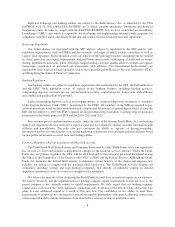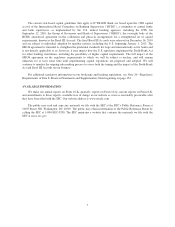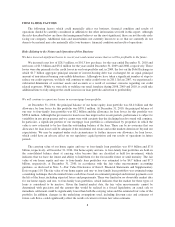eTrade 2010 Annual Report Download - page 18
Download and view the complete annual report
Please find page 18 of the 2010 eTrade annual report below. You can navigate through the pages in the report by either clicking on the pages listed below, or by using the keyword search tool below to find specific information within the annual report.If we are unable to comply with the terms of our capital plan in the ordinary course of business or are unable
to raise any additional cash equity to be contributed as capital to E*TRADE Bank or to further reduce our debt,
in each case, as may in the future be required by the OTS, we could face negative regulatory consequences.
If we fail to comply with applicable securities and banking laws, rules and regulations, either domestically or
internationally, we could be subject to disciplinary actions, damages, penalties or restrictions that could
significantly harm our business.
The SEC, FINRA and other self-regulatory organizations and state securities commissions, among other
things, can censure, fine, issue cease-and-desist orders or suspend or expel a broker-dealer or any of its officers
or employees. The OTS may take similar action with respect to our banking activities. Similarly, the attorneys
general of each state could bring legal action on behalf of the citizens of the various states to ensure compliance
with local laws. Regulatory agencies in countries outside of the U.S. have similar authority. The ability to
comply with applicable laws and rules is dependent in part on the establishment and maintenance of a reasonable
compliance system. The failure to establish and enforce reasonable compliance procedures, even if unintentional,
could subject us to significant losses or disciplinary or other actions.
If we do not maintain the capital levels required by regulators, we may be fined or even forced out of business.
The SEC, FINRA, OTS and various other regulatory agencies have stringent rules with respect to the
maintenance of specific levels of regulatory capital by banks and net capital by securities broker-dealers.
E*TRADE Bank is subject to various regulatory capital requirements administered by the OTS, which will soon
be administered by the OCC, and E*TRADE Financial Corporation will, for the first time, become subject to
specific capital requirements administered by the Federal Reserve. Failure to meet minimum capital requirements
can trigger certain mandatory, and possibly additional discretionary actions by regulators that, if undertaken,
could harm E*TRADE Bank’s and E*TRADE Financial Corporation’s operations and financial statements.
The Bank must meet specific capital guidelines that involve quantitative measures of E*TRADE Bank’s
assets, liabilities and certain off-balance sheet items as calculated under regulatory accounting practices.
Quantitative measures established by regulation to ensure capital adequacy require E*TRADE Bank to maintain
minimum amounts and ratios of total and Tier 1 capital to risk-weighted assets and of Tier 1 capital to adjusted
total assets. To satisfy the capital requirements for a “well capitalized” financial institution, E*TRADE Bank
must maintain higher total and Tier 1 capital to risk-weighted assets and Tier 1 capital to adjusted total assets
ratios. E*TRADE Bank’s capital amounts and classification are subject to qualitative judgments by the regulators
about the strength of components of its capital, risk weightings of assets, off-balance sheet transactions and other
factors. Any significant reduction in E*TRADE Bank’s regulatory capital could result in E*TRADE Bank being
less than “well capitalized” or “adequately capitalized” under applicable capital rules. A failure of E*TRADE
Bank to be “adequately capitalized” which is not cured within time periods specified in the indentures governing
our debt securities would constitute a default under our debt securities and likely result in the debt securities
becoming immediately due and payable at their full face value.
Similarly, failure to maintain the required net capital by our securities broker-dealers could result in
suspension or revocation of registration by the SEC and suspension or expulsion by FINRA, and could ultimately
lead to the firm’s liquidation. Net capital is the net worth of a broker or dealer (assets minus liabilities), less
deductions for certain types of assets. If such net capital rules are changed or expanded, or if there is an unusually
large charge against net capital, operations that require an intensive use of capital could be limited. Such
operations may include investing activities, marketing and the financing of customer account balances. Also, our
ability to withdraw capital from brokerage subsidiaries could be restricted, which in turn could limit our ability to
repay debt and redeem or purchase shares of our outstanding stock.
15
























